Standing over a simmering pot of chai, Stella Ku’s (古詩筠) gold bangles jingle as she crushes ginger roots and mixes freshly ground cardamom into individual saucepans. The tea leaves, handpicked from the misty mountains of Assam and Darjeeling, take 10 minutes for the perfect brew.
Ku herself is from Taichung, but this recipe hails from generations of her husband’s family, the skills passed down to her by her mother-in-law and perfected over months of practice in Punjab, India.
Indus Chai in Daan District (大安) is a small family-run business, blending rich Indian traditions with Taiwan’s growing demand for gluten-free dining. This spot is a rarity: a celiac-owned and operated business with an entirely gluten-free menu. For us gluten-eaters, it’s a quiet spot to while away a rainy afternoon with owner Rajat Majitha, always keen to share his wealth of tea-related expertise over a mug of spicy chai.
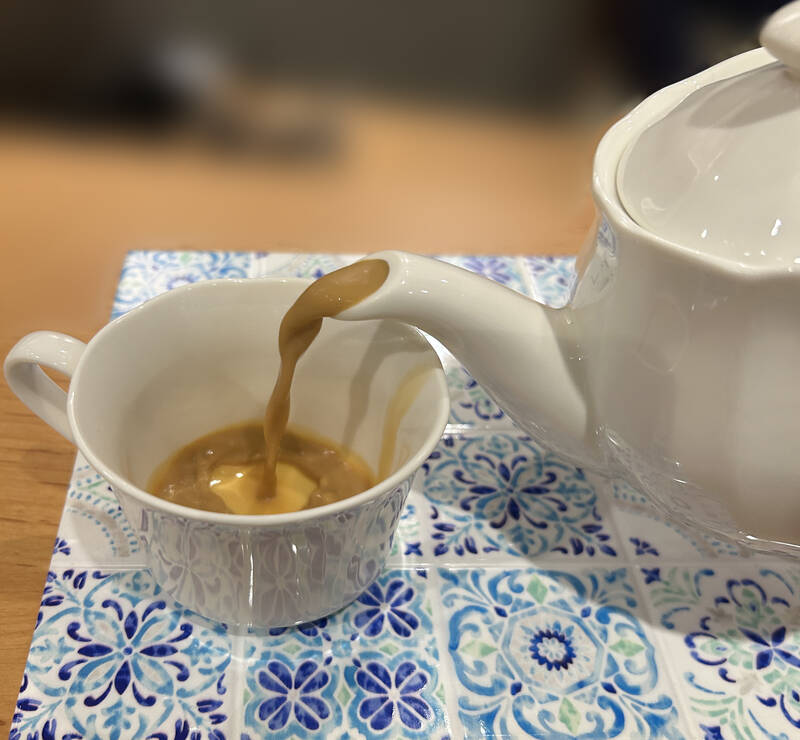
Photo: Hollie Younger
Chai is the most consumed drink in India after water.
“We don’t have a common language, dress or culture, but what unites India is chai,” Majitha says.
British colonialists took tea from China to India and utilized the lush climate, fertile soil and, ultimately, cheap labor. For the British elite, 90 percent of the tea leaves ended as waste, discarded as a fine dust. But for poorer local tea farmers and factory workers, it was gold dust: cheap caffeine.
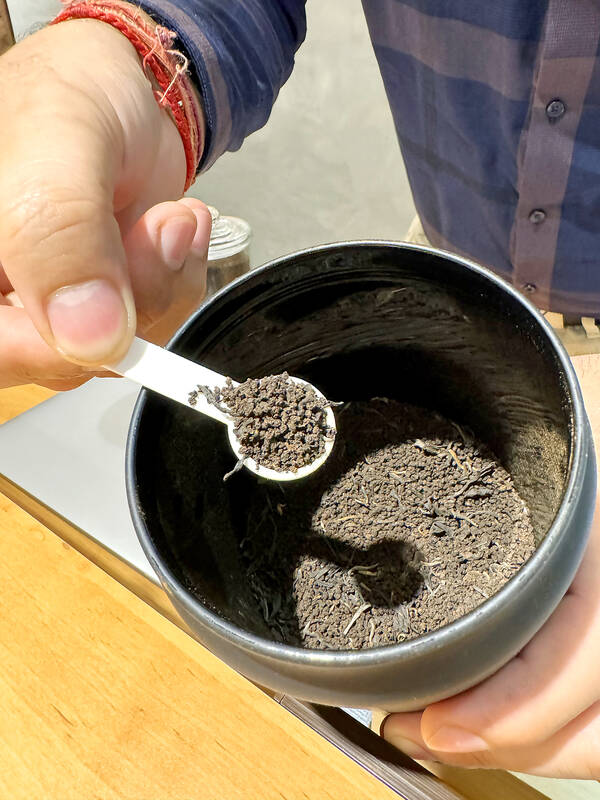
Photo: Hollie Younger
“India loves milk, and India loves spice,” says Majitha, which soothed the beverage’s bitterness as it spread across the country, sold from the shoulder poles of Chai Wallahs.
Today, chai is as much an art and a delicacy as its British-brewed ancestor. Majitha uses the world’s two best black teas, Darjeeling and Assam, which he hand-selects at auctions in India.
Indus Chai sells a range of brews, from fall specials with cinnamon and ginger to a green cardamom Elaichi Chai and their classic Masala Chai (all NT$340). Cardamom reduces body temperature for summer sipping, while ginger heats the body with a spicy kick. These China teapots of chai are expensive by Taipei standards, but each is made to order and uses only the best ingredients.
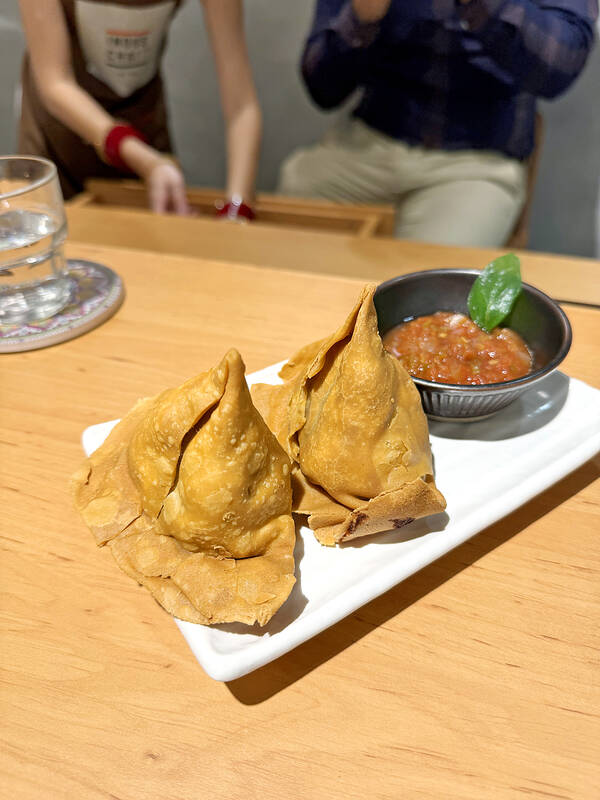
Photo: Hollie Younger
For the food options, I admittedly look to my celiac accomplice for her opinion; there’s a reason we typically use gluten for fluffy doughs and crispy batters. But the bread used for their Masala Sandwich (NT$260) is delivered by Taichung’s Kiseki Bakery and is pretty darn good, with the right balance of chewy and airy.
The samosa (NT$180) casing is crispier than expected, but it keeps the snack light with its heavy chickpea and potato-based filling. Without gluten as a binding agent, the chickpea, tapioca and rice flour dough cannot be folded or stretched. Majitha takes up to two hours each morning to hand-make the day’s samosas. My only complaint, why am I served Mexican-style salsa on the side when there exists such a thing as mango chutney?
The best snack is overwhelmingly the sabudana vada (NT$180), Indian-style hash browns served in thin discs with a mint-yogurt dip. These traditionally use tapioca pearls, an interesting use of Taipei’s beloved ingredient for desserts and bubble teas.
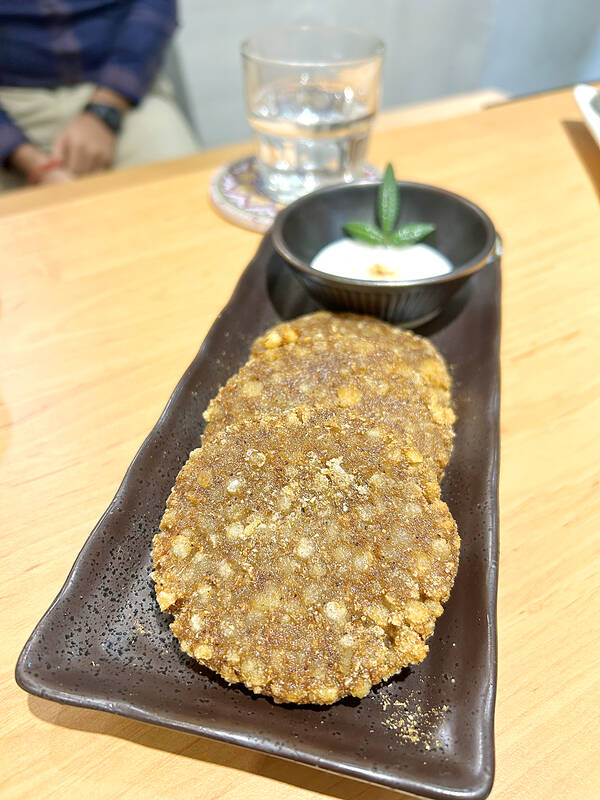
Photo: Hollie Younger
Celiac options in Taipei are extremely limited; there exists just a small selection of gluten-free restaurants and a discouragingly small Facebook group. Gluten-free diets appear to be incredibly rare here, due to genetic or lifestyle factors, when compared to Western capital cities. It’s not just noodles and bao buns to watch out for — gluten lurks in nigh-on everything Asian, from soy sauce to Taiwan Beer. But Majitha takes care to keep every process and every surface free from flour and contaminants, while Ku puts just as much love into each pot of chai.
Overall, Indus Chai delivers on its promise: exceptional tea, celiac-safe snacks, and a warm slice of India in the heart of Taipei.
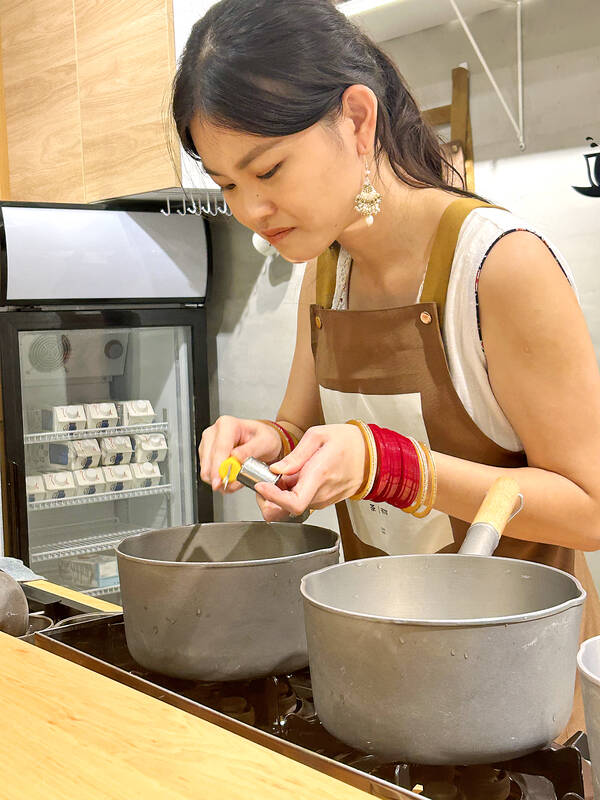
Photo: Hollie Younger

Taiwan has next to no political engagement in Myanmar, either with the ruling military junta nor the dozens of armed groups who’ve in the last five years taken over around two-thirds of the nation’s territory in a sprawling, patchwork civil war. But early last month, the leader of one relatively minor Burmese revolutionary faction, General Nerdah Bomya, who is also an alleged war criminal, made a low key visit to Taipei, where he met with a member of President William Lai’s (賴清德) staff, a retired Taiwanese military official and several academics. “I feel like Taiwan is a good example of

March 2 to March 8 Gunfire rang out along the shore of the frontline island of Lieyu (烈嶼) on a foggy afternoon on March 7, 1987. By the time it was over, about 20 unarmed Vietnamese refugees — men, women, elderly and children — were dead. They were hastily buried, followed by decades of silence. Months later, opposition politicians and journalists tried to uncover what had happened, but conflicting accounts only deepened the confusion. One version suggested that government troops had mistakenly killed their own operatives attempting to return home from Vietnam. The military maintained that the

Before the last section of the round-the-island railway was electrified, one old blue train still chugged back and forth between Pingtung County’s Fangliao (枋寮) and Taitung (台東) stations once a day. It was so slow, was so hot (it had no air conditioning) and covered such a short distance, that the low fare still failed to attract many riders. This relic of the past was finally retired when the South Link Line was fully electrified on Dec. 23, 2020. A wave of nostalgia surrounded the termination of the Ordinary Train service, as these train carriages had been in use for decades

Lori Sepich smoked for years and sometimes skipped taking her blood pressure medicine. But she never thought she’d have a heart attack. The possibility “just wasn’t registering with me,” said the 64-year-old from Memphis, Tennessee, who suffered two of them 13 years apart. She’s far from alone. More than 60 million women in the US live with cardiovascular disease, which includes heart disease as well as stroke, heart failure and atrial fibrillation. And despite the myth that heart attacks mostly strike men, women are vulnerable too. Overall in the US, 1 in 5 women dies of cardiovascular disease each year, 37,000 of them